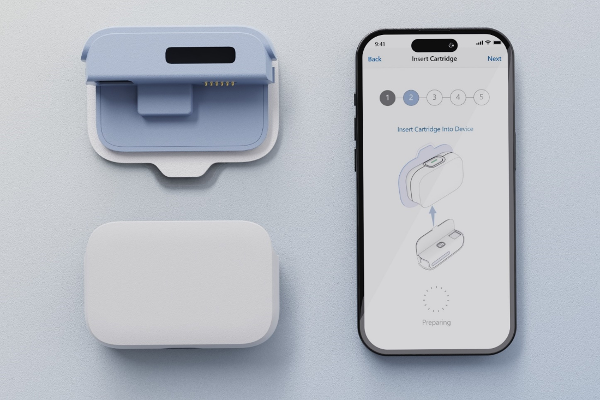
A new prototype medical device that deploys wearable microneedles to deliver medication to patients in an at-home setting has the potential to meet some of the emerging trends in the healthcare sector, according to Tyndall researchers.
The ‘smart’ wearable drug delivery concept, developed by West Pharmaceutical Services, Tyndall National Institute and PA Consulting, uses the microneedle technology to painlessly deliver medication through the skin. Designed to give patients the ability to self-manage their medication, the prototype delivers doses in a timely manner meaning patients don’t have to worry about remembering their drug regimen. This technology has the potential to be used across a range of chronic conditions, including autoimmune and cancer treatments, and enabling patients to self-manage their treatment in an at-home setting.

This research project uses precision microneedles to ensure correct depth of medication delivery into the skin, with embedded sensors providing dose control for patients during injection. The working prototype also utilises innovative features such as a micro pump for precise fluidic control and connectivity to a smartphone app.
The prototype is designed in two halves. A reusable section including durable components and electronics and a disposable section that comprises the drug and skin contact parts. Both re-usability and waste reduction were key objectives within the project to pave a path towards a circular economy.
Project Leader and Senior Manager of Research and Technology at West, Dr Alex Lyness, said:
“There is now a clear healthcare drive globally to move from hospital to the home to improve the overall patient experience and help reduce healthcare costs. Being a leader in the field of at-home self-injection technologies, West is investing significantly in R&D. This highly collaborative initiative with Tyndall and PA has the potential to have huge societal impact, empowering patients to take their medication at home via microneedles in a more efficient, painless and safe manner. This project is at the forefront of a movement towards more sustainable at home drug delivery options, which may become the norm as the industry looks to find more sustainable ways to treat patients worldwide.”
Dr Conor O'Mahony, Principal Researcher at the Tyndall National Institute, said:
“Utilising our world-leading research expertise in information and communications technology, we have worked with West and PA to harness the innovative applications of microneedles to create a prototype drug delivery device that has the potential to transform at-home patient care in an unprecedented way.”
Medical Design Director and PA lead on the project, Eugene Canavan, said:
“The sustainable aspect to this device concept is something we haven’t seen in this field up to this point, with its pioneering design culminating in a prototype that effortlessly fits into a patient’s daily routines, enhancing user engagement, and ensuring adherence. We believe this is the future of wearable drug delivery systems.”
John Nugent, Department Manager, Medical Technologies & Healthcare, IDA, said:
“This project embodies the very best of innovative collaboration, drawing on the expertise of the three organisations involved to mesh perfectly, with Ireland’s tech ecosystem as a key enabler.”
The project was first conceived in 2016 when West and Tyndall began researching how to deploy innovative wearable on-body drug delivery systems to overcome the challenges faced by patients using traditional syringes having to self-inject at home. Partnering with PA Consulting, the research team focused on creating a concept that could one day be the standard in wearable drug delivery systems. This project was part-funded by the Enterprise Ireland Innovation Partnership programme and supported by the Irish Development Agency (IDA).
Patent applications have now been submitted by the organisations involved to protect and expand R&D on the technology. Since the initiation of this project in 2017, West Pharmaceutical Services has significantly expanded its R&D operations in Dublin.
The project was a finalist in the 'Collaboration in Medtech' category at the recent Irish Medtech Awards 2023 as part of Medtech Rising: The Business Leaders’ Conference.
In recent years West Pharmaceuticals has increased its presence in the Republic, expanding the headcount at its Waterford manufacturing plant and in Dublin where its research and development unit is located.
